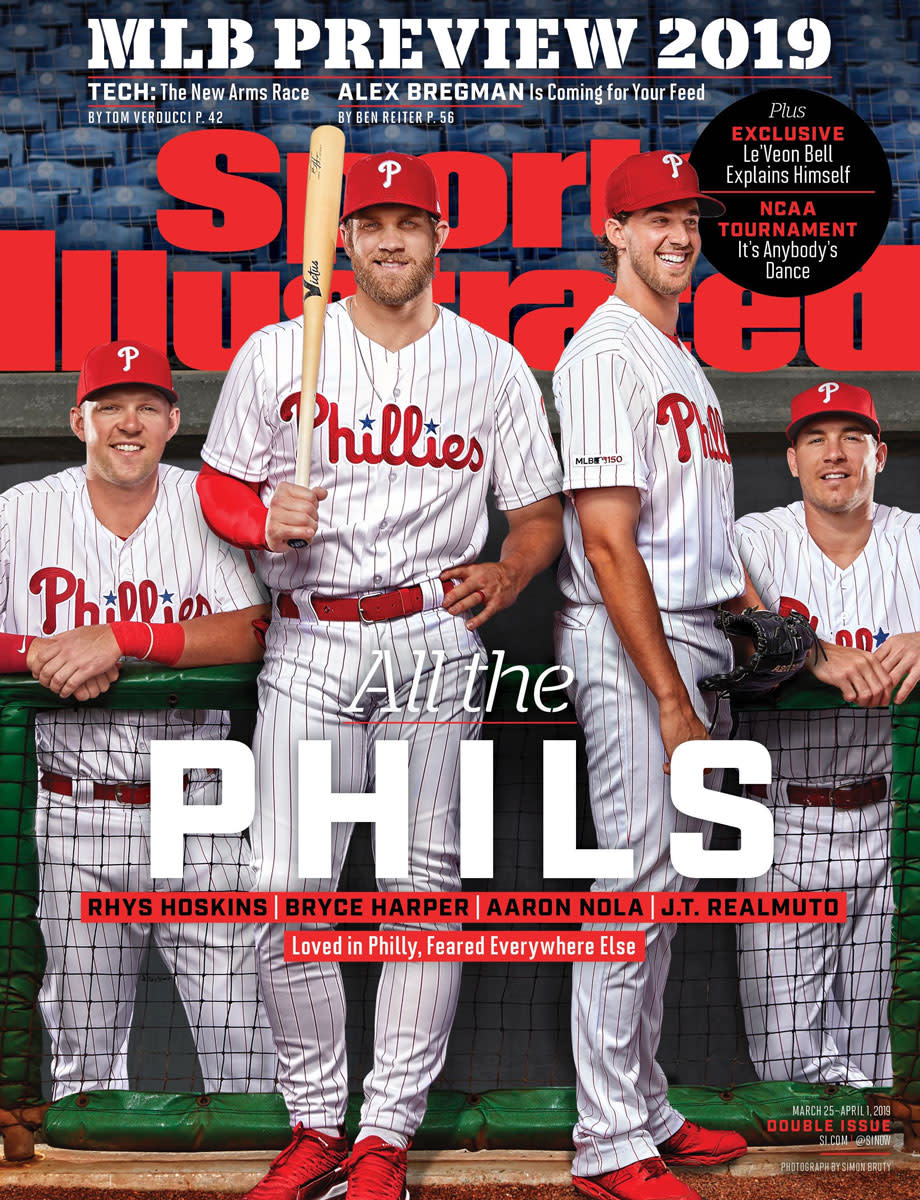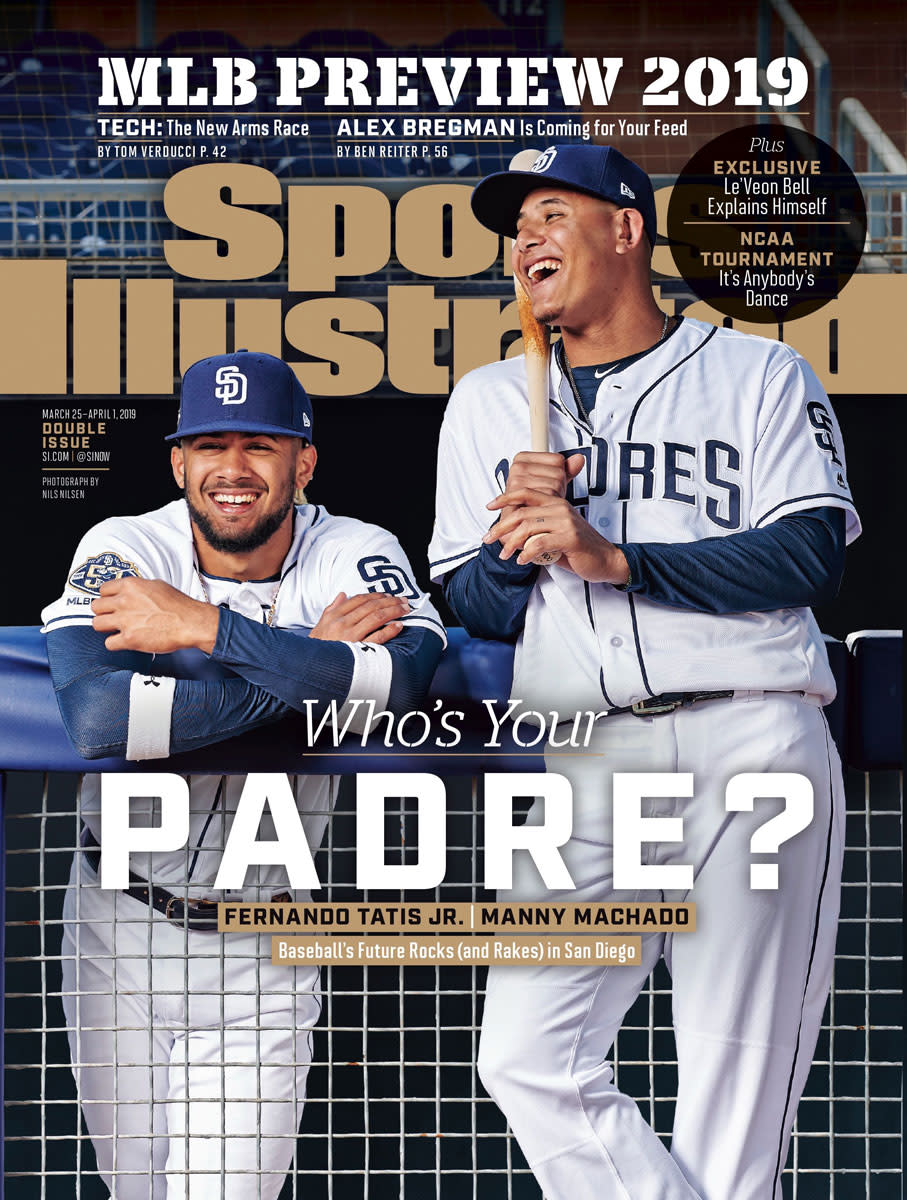Bryce Harper and the Phillies Join the Twins, Mets and Padres as the Top Turnaround Teams of 2019

J.D. Martinez is a hitting savant. He is right there with Joey Votto and Justin Turner when it comes to knowing the mechanics of the swing and the mental side of hitting. His Red Sox teammates are smart to listen to him.
But when it comes the state of competitiveness in baseball, his acumen isn’t as impressive. Martinez told WEEI.com last month, “It’s more of a race towards the bottom now than a race towards the top. You can go right now through everyone’s lineup and you already know who’s going to be in the playoffs. What’s the fun in that? We might as well fast-forward to the end of the season.”
Wrong. Dead wrong.
Like Oakland and Atlanta last year, there will be surprise teams that crash the October party. Why so sure? Because surprise teams happen every year. It’s one of the few ironclad guarantees in baseball. Every year for 13 straight years and for 23 of the 24 seasons with the wild card the postseason has included at least one team that finished with a losing record the previous year—and on average, two of them. There have been 52 such turnaround teams in 24 years.
There were 14 losers last year. One or two of them are going to the playoffs this year. Which ones? Hey, that’s the uncertainty, but I’ll give you my picks below.
First, I understand the frustration whence Martinez’s comment derives. He twisted on the recalibrated free agent market last year until February. His agent is Scott Boras, who has been railing against what he calls the “non-competitive cancer” in baseball. Players aren’t happy. They see mid-level veterans who used to strike it rich in free agency being replaced by younger, cheaper, more reliable and often better players.
They see too many teardowns around the game. Yes, but nobody mentions the 2015 White Sox, the epitome of why spending money when you are at best a middle of the road team is an outdated strategy. Those White Sox spent $132 million on free agents, all between 30 and 35 years old. They finished 76-86 and finished 13th in the league in attendance, exactly where they were the previous season. So then they blew it up.
The players complain about a “broken” free agent system, but in a span of nine days three teams spent $890 million on just three players (Manny Machado, Bryce Harper and Nolan Arenado)—or $90 million more than the entire San Diego franchise sold for just seven years ago. On Tuesday, the Angels signedMike Trout to the richest contract in the history of pro sports.
This is not to say there are not problems with salary distribution in baseball. As one agent said, the problem is that the current CBA was put in place before analytics became industry standard. So now we get Competitive Balance Tax thresholds acting like soft caps and Wins Above Replacement fitting players into slots to fit under it.
“We have set up an analytic measurement of value in which 98% of major league players have a measurement by WAR that says that are worth 1.4 or below,” the agent said. “So 98% of the league is worth less than $12-15 million a year. The problem with that measurement is when [someone] puts up a 9.4 WAR no one uses the measurement at the top of the pay scale.
“And when you say that to teams, they say the reasoning for that is we value the WAR, but the structure of luxury tax doesn’t allow us to.”
So, yes, there are reasons for the players to be unhappy. But sorry, J.D., knowing the 10 playoff teams before the season starts is not one of them.
Last year, for instance, the players association filed formal complaints that four teams were not spending enough of their revenue-sharing money on players. Then one of them won 97 games and went to the playoffs (Oakland), another won 90 games (Tampa Bay), another chased the wild card and finished with a winning record (Pittsburgh) and only the fourth truly was bad (Miami).
Predicting playoff teams is a tough business. It is not as easy as looking at payrolls. The people at Baseball Prospectus are very smart and armed with all sorts of algorithms to crunch numbers. Their PECOTA forecasting system draws from a database of more than 35,000 major and minor league player seasons. It is not back-of-the-envelope accounting.
And yet last year PECOTA correctly forecasted only six of the 10 playoff teams, not much better than a flipped coin. They missed the win total of teams by an average of 7.5. They missed half the teams in baseball by six or more wins. That’s not a knock on PECOTA. It’s a reflection of how difficult baseball is to predict, especially as teams change so much over the course of the season. The Red Sox won the World Series with six players on their series roster who were not on the Opening Day roster, including the MVP (Steve Pearce).

Who saw the A’s jumping from 87 losses to 97 wins? How about the Braves going from 90 losses to 90 wins? Not me. Each year I try to predict which losers from the previous season will become playoff teams. I had a 63% success rate—until last year, when I whiffed on my top two turnaround teams, the Mets and Angels.
Two of the strongest factors in trying to find surprise teams are a new manager (37% of turnaround teams had one) and big improvement in run prevention, which is a greater predictor than improvement in run production.
Neither Oakland or Atlanta had a new manager, but the run prevention improvement for each was massive: 152 fewer runs allowed by Oakland and 164 fewer runs allowed by Atlanta. And guess who finished 1–2 in the majors in defensive efficiency? Oakland and Atlanta.
This year we have 14 choices to join the long line of losers-to-playoffs. Here are my rankings for the teams most likely to be surprise playoff teams this year.
1. Philadelphia Phillies
I liked the energetic vibe in Phillies camp, which happens when you add two former MVPs (Harper and Andrew McCutchen), the best catcher in baseball (J.T. Realmuto), the shortstop with the highest batting average over the past three years (Jean Segura) and a reliever who has pitched in 60 games nine straight years to the tune of a 2.72 ERA (David Robertson).
Hittting coach John Mallee said it best as he took inventory around the clubhouse: “I saw Cutch and said, ‘That’s a dude.’ And then it was like ‘And that guy’s a dude, and that guy’s a dude …’ There’s a lot of talent, experience and professionalism added.”
The Phillies don’t have a new manager, but Gabe Kapler has to be better than he was as a rookie manager in 2018, when he was too quick to make changes. Here’s what I wrote about the Phillies before last season:
I envision Philadelphia being this year’s version of the 2017 Brewers: getting out of the gate well and with enthusiasm to surprise people, bidding for the postseason, but succumbing in the final two months to a lack of depth.
That’s exactly how it played out. The Phillies were in first place on Aug. 11, but after that went 15–31. Now they’ll try to become this year’s version of the 2018 Brewers. For that to happen, the biggest upgrade for Philadelphia has to be its defense.
Last season Philadelphia ranked 29th in defensive efficiency and 29th in batting average on balls in play. Its pitching staff is loaded with swing-and-miss stuff. It finished behind only the Dodgers in strike percentage, swinging strike percentage and strikeout rate. But the defense has to be at least average to turn more batted balls into outs.
PECOTA has Philadelphia improving by 51 runs allowed this year. That might not be enough. As much as we love offense, run prevention is what defines playoff teams. Last year nine of the best 11 teams at run prevention made the playoffs. The only playoff team outside the top 11 has an excuse because of where it plays: Colorado.
2. Minnesota Twins
With seven players who have hit 20 homers in a season, this team is going to mash. Eight of their top nine position players are between 25 and 30 years old—right in the sweet spot of a career. The starting pitching is solid. They have the new kind of new manager that can make a difference for a turnaround team. Their run prevention improvement, and therefore their playoff chances, comes down to their bullpen.
Maybe erstwhile starter Fernando Romero becomes a difference maker in support of Taylor Rogers and Trevor May, though Minnesota should sign Craig Kimbrel, a made-to-order finishing piece for a contender. Last season the Twins’ bullpen ranked 21st in ERA, allowed the fourth most runs and gave up the fourth-most home runs of any bullpen in history—the kind of season that gets a manager fired, which is what happened to Paul Molitor.
New skipper Rocco Baldelli brings energy and optimism. Pitching coach Wes Johnson, the Sultan of Spin, was an inspired hire. Johnson has turned Martin Perez from a struggling sinkerball pitcher into a four-seam monster.
The biggest new impact might be from a pair of young players trying to bounce back, Byron Buxton and Miguel Sanó. Two year ago they combined for 7.7 WAR. Last year they combined for -0.8. Buxton put on 20 pounds, stopped listening to all the hitting advice in his ear, ditched his leg kick and seems to be playing with a chip on his shoulder. Sano, injured again, will miss most of April. Third base coach Tony Diaz has become an important mentor for Sanó to help get his mind and body right.
3. New York Mets
I would have placed them higher, but for going out on a limb on them last year. I thought pitching and new manager Mickey Callaway would carry the 2018 Mets, but did have reservations:
This team will hit a ton of homers, though the offense lacks balance. No team in the Statcast era (2015-17) has averaged a higher launch angle than the flyball-happy Mets. And their age and lack of athleticism puts them at greater risk of injuries. But with decent health from their starting pitchers and with Callaway, an inspired pick, helping to bring out the best in them, the Mets will be in the playoff hunt.
They didn’t hit home runs (finishing ninth in the league) and too many of their position players did break down. Callaway made plenty of rookie mistakes, leading to just 77 wins despite a run prevention improvement of a whopping 156.
This Mets team will break down again because of age, but it’s better equipped with depth to withstand injuries. And the bullpen, which was terrible last season (only the Miami bullpen was worse in the NL), will help improve the run prevention even more.

4. San Diego Padres
This is one of the most unpredictable teams in baseball. They are loaded with high-end young talent, such as Fernando Tatis Jr., Chris Paddack and Luis Urias, but with such young players you just can’t be certain how quickly they develop into reliable major leaguers.
But Manny Machado is a top-10 player and Eric Hosmer, Wil Myers and Manny Margot each should be better than they were last year. Machado certainly will help a defense in dire need of improvement. Only the Phillies were worse last year at turning batted balls into outs and nobody was worse on batting average on balls in play.
With Machado and Tatis on the left side, and a rotation that needs help, San Diego ought to sign Dallas Keuchel. Nobody last year induced more groundball outs to the left side from righthanded hitters than Keuchel—and nobody was close.
